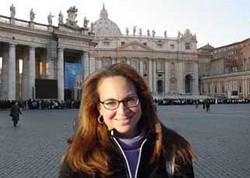The regular cycle of the Pope’s work is addressing those groups that advise him on a variety of subjects like theology, law, science, politics, life issues, etc. Benedict’s address to Professor Mary
Ann Glendon, President of the Pontifical Academy of Social Sciences, talks about the theme of “Universal
Rights in a World of Diversity: the Case of Religious Freedom.” He reminds not only the head of this academy about the deep roots of Western culture being Christian, but it was Christianity that gave humanity the awareness of the various freedoms we know and love, that contribute to human flourishing and many time even take for granted. It was the Christian gospel that upheld and promoted the dignity of the human person, protected women and children, that organized labor freedom of worship, and other social systems. Most notably, the Pope reminds us, that the freedoms spoken of in the United Nations’ Universal Declaration of Human
Rights have their roots in our belief and life in Christ. However, we can’t become smug –too satisfied– with what we’ve been given, even freedom. The Pope’s talk is not long but here are some germaine points for us to consider:
Deeply inscribed
in our human nature are a yearning for truth and meaning and an openness to the
transcendent; we are prompted by our nature to pursue questions of the greatest
importance to our existence. Many centuries ago, Tertullian coined the term libertas
religionis (cf. Apologeticum, 24:6). He emphasized that God must be worshipped
freely, and that it is in the nature of religion not to admit coercion, “nec
religionis est cogere religionem” (Ad Scapulam, 2:2). Since man enjoys the
capacity for a free personal choice in truth, and since God expects of man a
free response to his call, the right to religious freedom should be viewed as
innate to the fundamental dignity of every human person, in keeping with the
innate openness of the human heart to God. In fact, authentic freedom of
religion will permit the human person to attain fulfilment and will thus
contribute to the common good of society.
